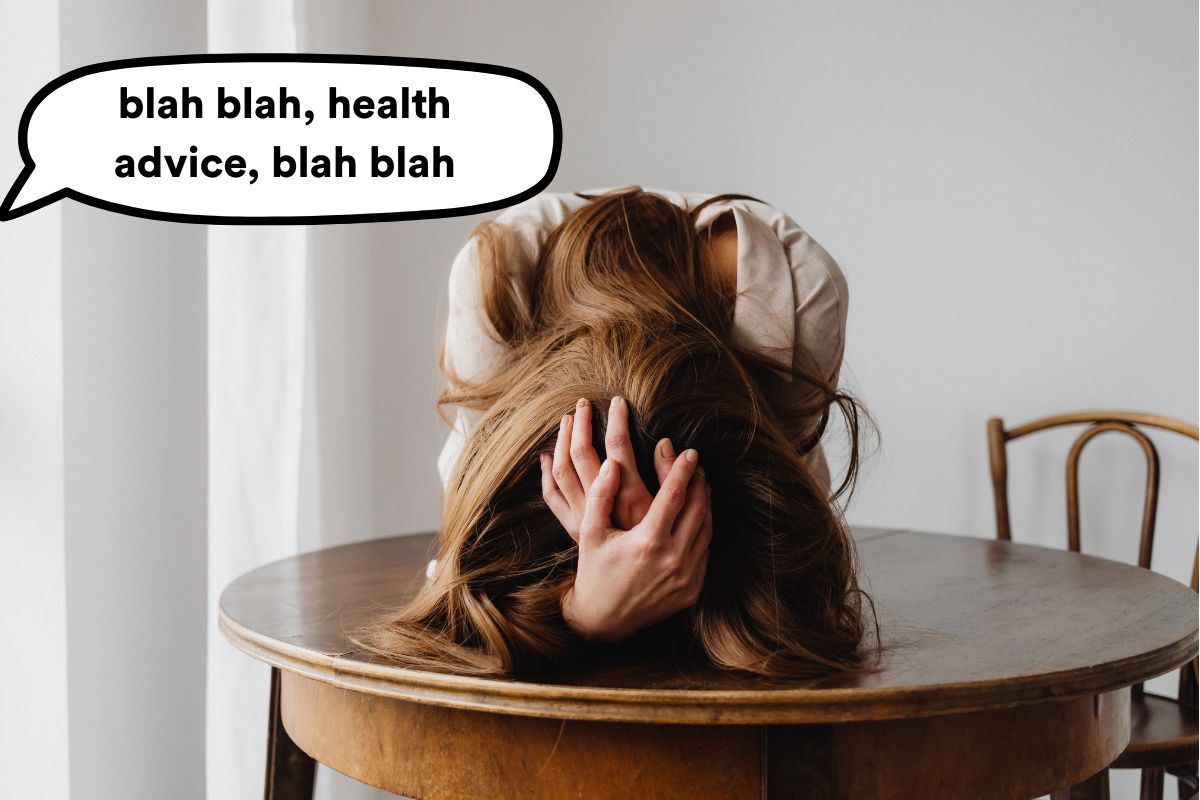
When generic wellbeing advice doesn’t fit your life, remember, it’s not you, it’s the advice. Sometimes, what you really need is a personalised plan and a good conversation with an expert.
I was part of a fascinating conversation the other day with Dr. Amy Reynolds about developing sleep resources for students.
Amy highlighted that sleep is one of the biggest challenges university students face. It’s an even bigger problem for those managing placements (like in health degrees) or regular shift work. These requirements can play absolute havoc with their circadian rhythms, and for some, it can lead to diagnosable sleep disorders that require professional input.
But another key insight that she shared was that standard-issue “sleep hygiene” recommendations can actually backfire for these groups.
Why? Because the advice is often:
- Impossible to implement (e.g., “go to bed at the same time every night” is useless for a shift worker).
- Ineffective against the sheer scale of the sleep deficits they’re facing.
- Slowly demoralising as the student tries, fails, and concludes they are the problem.
Instead of being a source of help, the generic advice becomes a source of distress and frustration.
The Problem Isn’t Just Sleep 💤
This got me thinking. I believe this exact dynamic happens in many other areas of self-care and self-help.
We see generic health recommendations everywhere. But when those instructions are a poor fit for an individual’s life, they can have the opposite effect. Instead of increasing wellbeing, they introduce frustration and at worst, self-punishment.
This is one of the central challenges of my field: mental health promotion.
On the BetterU blog, our goal is to craft publicly communicable messages that are relevant to a significant portion of the student population. For example, when I write a post on self-compassion, I’m aiming for it to be useful to as many students as possible.
But I always know in the back of my mind that many won’t find value in it, simply because their life and their challenges are different and I can’t perfectly tailor the content to their situation.
When Generic Advice Isn’t Enough 💭
My clinical psychology roots are in individual treatment, so I know well that our personal challenges aren’t always well-served by generic advice. Sometimes, we need the individualisation and customisation that comes from a one-on-one conversation.
This is worth keeping in mind if someone has ever suggested you “go see someone.”
It might be because your situation is more severe, but it’s just as likely that they recognise that generic advice doesn’t have the necessary customisation to be relevant to you. When you speak to an expert, the likelihood of finding a solution that is truly tailored to your situation is much higher.
I’ve had problems in my life that I was able to address using generic advice (like getting fitter or sorting out my finances). But I’ve also had problems that required problem-solving with an expert or mentor to find the right path forward (like navigating career trajectory, grief, or specific health conditions).
Principles vs. Plans 🧩
On the BetterU site, we offer a lot of evidence-based generic advice. Take my collection of time management tips, for example.
Those tips don’t try to account for every student’s unique scheduling challenges. Instead, they try to articulate principles of time management that can be applied in different scenarios.
But it is absolutely the case that someone reading that might think, “These aren’t things I can do in my situation.”
That person would likely benefit from making an appointment to see a Student Success & Wellbeing Advisor, providing context on their situation, and getting more targeted advice.
It’s a balance we are always trying to strike.
One of the most elegant solutions I’ve seen to this problem (at least in the context of mental health) is the Be Well Plan. It’s a program that can be delivered to many people, but it avoids being too generic by building individualisation steps right into the process. It uses assessment tools to help you find your target areas and then gives you a choice of activities. This means 100 people can do the same program but walk away with 100 different personalised wellbeing plans.
The Takeaway: It’s Not You, It’s the Advice 💬
So, what am I trying to say here?
- Broadly speaking, there will be times when generic health and wellbeing advice is great and can be neatly integrated into your life [Just try to get that advice from reputable sources – topic for another day]
- There will also be times when that same advice isn’t suited to your unique circumstances.
If you find yourself in that second group, where the advice just doesn’t fit, or worse, makes you feel more frustrated, please know this: The problem isn’t with you. It’s with the generic nature of the advice.
Consider this feeling a trigger. It’s a sign that you might need to step up the level of input for that area of your life.
For a Flinders student, this means chatting to an expert. This could be a doctor, counsellor, or disability advisor at Health, Counselling and Disability Services (HCDS), or an SSWA for study-related wellbeing [Note: it might not even be a health professional – there are many support people and programs at Flinders, across multiple areas]
There is absolutely no shame in needing to speak to an expert. It’s simply a recognition that your situation needs and deserves individualised advice, which is best achieved in a direct conversation.
(And as for those sleep resources we were discussing? Stay tuned for those in 2026.)


